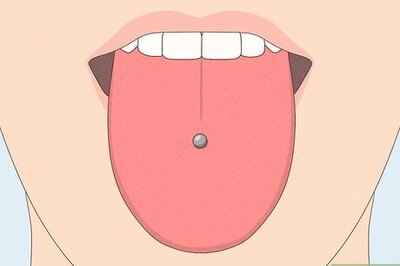
views
Gluten is a protein that is found in certain grains, wheat being one of the most popular ones. Rye, barley, malt and malt-derived food products (malt vinegar) and brewer’s yeast (byproduct of making beer) also contain gluten. Gluten helps the grain flour get a stretchy texture when mixed with water and this gives most breads that fluffy, airy texture most people enjoy. Gluten is also said to enhance taste.
Some people are sensitive to gluten and consuming it can cause serious health issues for them. This is the reason gluten-free diets are gaining popularity recently. A gluten-free diet is recommended for people with celiac disease. It is also said that going gluten-free can promote digestive health, weight loss and athletic performance.
Who should follow a strict gluten-free diet?
Those who are suffering from any of the following conditions could benefit from a gluten-free diet:
1. Celiac disease: It is an autoimmune disorder of the digestive system that is characterized by severe gluten intolerance. In this disease, gluten consumption triggers the immune system to destroy the inner lining of the small intestine. Over time, it affects the absorption of nutrients and can cause nutritional deficiencies. People who have celiac disease are recommended to follow a lifetime gluten-free diet.
2. Irritable bowel disease (IBS): It is a chronic digestive condition that can cause cramps, abdominal pain, flatulence, bloating, diarrhea and constipation. Also, a study published in the journal of Clinical Gastroenterology and Hepatology in 2015 found the gluten-free diet to be effective in relieving the symptoms of IBS.
3. Non-celiac gluten sensitivity: It is possible for some people to experience symptoms similar to those of celiac disease but they do not test positive for it. In such cases, you could speak to your doctor about trying a gluten-free diet for some time and if it relieves the symptoms, continue with the diet.
4. Wheat allergy: Some people may be allergic to all of the proteins present in wheat (albumin, globulin, gliadin and gluten) specifically. A wheat-free or gluten-free diet may be suitable for such people. It’s best to consult a doctor and nutritionist before making any big changes in your diet.
Who can benefit from a gluten-free diet?
As mentioned above, a gluten-free diet can help reduce inflammation in patients with celiac disease and other inflammatory diseases of the digestive system such as IBS.
It may also help in weight loss as most of the junk and processed foods get eliminated while following a gluten-free diet. However, a study published in Diabetes Sprectrum (2017) claims that a gluten-free diet contains less amount of dietary fiber, which suggests it may not be able to aid with healthy weight loss.
Additionally, there are also some claims about how gluten-free diets can provide better energy and promotes athletic performance. More research on this is needed to confirm the claims.
Who should avoid a gluten-free diet?
Whole-grain wheat products such as bread, cereal, pasta and others contain fiber, various vitamins (riboflavin, folate, thiamin, niacin, etc.), minerals and micronutrients. Following a gluten-free diet might deprive your body of these essential nutrients. This can, later on, give rise to different deficiency-related symptoms. If you can tolerate gluten and do not have any medical problems that require a gluten-free diet, you may want to continue with your regular diet or make sure your gluten-free diet fulfils all your nutritional requirements.
Furthermore, a gluten-free diet might be expensive as most of the easily-available food items will be replaced with imported gluten-free products. Also, you have to be more vigilant about the hidden gluten in many food items such as processed meats, sauces, gravies, packaged foods, candy and desserts. These products might not shout out “gluten-free” to you but they might have trace amounts of gluten.
Some gluten-free foods may contain a higher amount of sugar and fats than regular foods, so it is important not to just go for the gluten-free label. Instead, check the label for details on sugar, fat, overall calories, salt and other nutritional contents.
In the end, a gluten-free diet requires excessive planning. It may also be associated with a few risk factors, so it is very important to consult a doctor or nutritionist before starting with the diet.
For more information, read our article on Gluten-Free Foods.
Health articles on News18 are written by myUpchar.com, India’s first and biggest resource for verified medical information. At myUpchar, researchers and journalists work with doctors to bring you information on all things health.
Read all the Latest News, Breaking News and Coronavirus News here

















Comments
0 comment